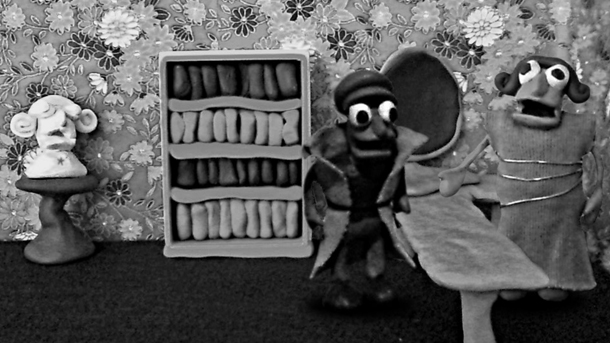Games are big business! Huge companies spend hundreds of millions of dollars paying massive teams of developers to slave away for years producing blockbuster online shooters that push the boundaries of hyper-realistic graphic technology! Games are also made by one person, like Deirdra Kiai who used some clay to make a video game called Dominique Pamplemousse.
Dominique Pamplemousse is the protagonist of Kai’s short adventure game. Dominique is a person of non-specific gender who paid a lot of money for a college degree that resulted in nothing but a series of dead-end jobs. Now Dominique is a two-bit private dick who is months behind on the rent, about to be evicted, and has to score one a big case or end up on the street.
It’s a farcical spoof of hard-boiled detective stories, using a squishy little protagonist made out of clay. Rather than speak in noir dialect, the characters all sing their lines, which makes Dominique Pamplemousse a musical, claymation, detective story featuring a protagonist of non-specific gender.
The developer doesn’t just refute typical video game story-telling, but also dispenses with any trace of cutting-edge technology. This game uses clay models for it’s characters, and cardboard sets for the background art. It even runs in a 4X3 aspect ratio, and is presented in black & white too. Even the interface gets in on the act. When players need to open the “Options” menu, there is a little gear made out of clay for them to click on. When players want to close a dialog screen, there’s a clay “X” up in the corner too.
The mechanics are old-timey adventure game mechanics. Dominique is controlled through a point-and-click interface, and moves through a series of locations to interact with other characters. Dominique has conversations with suspects, searches locations for useful items, and occasionally solves a puzzle by interacting with more than one thing at a time.
It’s not challenging at all; there are only two or three sequences that require players to solve a puzzle in order to proceed with the story, and there are liberal hints along the way. The rest of the game is no more demanding that clicking through dialog choices and gathering a couple of items hidden in the environment.
The low challenge level is quite deliberate. With a running time of 90 minutes, and very little difficulty, the developer is clearly out to ensure that players reach the end of the story. There is a plot-based choice near the end which means that players can go back for a second run to see what happens.
The story is that a famous singer named Casey Byngham has gone missing, and the head of his record label has hired Dominique to track him down. Dominique will have to deal with with the woman who runs the record label – and she juuust might be hiding something. Along the way there are scenes with a petulant teen, a forgetful old lady, and a hostile landlord.
When players click on things or people, Dominique will sing about them, instead of speaking. Other characters will deliver witness arias when asked about the disappearance. When Dominique interrogates suspects, they literally sing – even though they won’t necessarily confess.
Each location has a different underscore playing when Dominique arrives, so the musical dialog forms a distinct song for every character. The singing isn’t going to win any Tony Awards, but it not intended to blast players out of their seats like Wagner. It’s light and bouncy, in the style of musical comedy, often performed in goofy voices.
The mere existence of a musical game is a nice change of pace for the industry anyway. In the past there have been a few games that threw in musical numbers on occasion (Thank you, Bard’s Tale), but Dominique Pamplemousse is different because the use of music is persistent throughout the adventure.
Everything about Dominique Pamplemousse subverts what the mainstream game industry is about. It’s a true indie, and not just because it’s a crowdfunded project made by one person and distributed without a publisher. It IS all of those things, but also addresses things like gender identity, the educational system, underemployment, and the use of autotune in pop music. Let’s see Call of Duty Ghost Ops III do that!



0 Comments